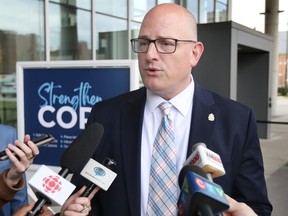
Article content
By: Lloyd Brown-John
I am not now, nor have I ever been, a person who can live comfortably in a city.
Article content
Certainly, I have lived in — or sometimes endured — cities: Toronto, Ottawa, Vienna, Brussels, Melbourne, but that does not habituate me to love life in a city.
Recently, I had to provide some of that authenticity stuff you need for assorted access to password-active website things. I was asked the name of the street I grew up on and my first telephone number!
Advertisement 2
Article content
Our street was a gravel trail with four houses in the bush, and our bush track had been given a name by somebody. Our first telephone number was 4H on a party line of 12 households. We cranked a handle to arouse the operator. Listening in on the conversations of others went with having a party line.
I shudder at the thought that as I decay I may someday end up confined to a condo-cave on the 91st floor of a structure with a spectacular view nowhere.
Despite my cultural predisposition, I acknowledge that I am overwhelmingly out-voted by those living in cities. Cities are where you can succeed or fail with ease. Cities do matter — and their cores are absolutely critical to their success.
Urban activist Jane Jacobs (1916-2006), who stirred more controversy about how to live in, and manage, cities than any other urban thinker, argued vigorously that cities were for people and not cars. She argued throughout her career for empowerment of citizens within neighbourhoods where they dwelt.
Jacobs coined the term “Vancouverism” to describe a city environment where the city core is inhabited by large numbers of permanent residents, and that those who live in neighbourhoods are best-equipped, not only to understand their unique urban environments, but to care for and promote their successful habitation.
Advertisement 3
Article content
Thus, when Windsor Mayor Drew Dilkens and Ward 3 Coun. Renaldo Agostino spoke during the recent announcement of a significant initiative intended to revitalize Windsor’s core, I was intrigued and hopeful.
Naturally, the first question I asked myself was: Is this a top-down initiative or one spurred by those seeking to succeed with lives and businesses in downtown Windsor?
Initially, the possibility that the mayor would use super-duper strong mayor powers to extract a budget to launch the initiative, suggested that this is a ‘top-down’ project.
It seems absolutely essential that those in the core of a city be viewed as a community with profound interests in how their neighbourhood is arranged and managed. In other words — discussions of budgets aside — how well involved have those who live, work and operate businesses in Windsor’s core been engaged in planning its future?
If the mayor proposes increasing the city’s annual operating budget by about $3.2 million — an additional 0.7 per cent in property taxes — then where is the evidence that supports taxpayers’ understanding of what they will receive in added benefits?
Advertisement 4
Article content
Will this be simply the same downtown core with a few million spent on decorative bling, or will the money from extra taxes actually result in a more amenable, pleasant and welcoming environment?
I entirely support anything that will make Windsor’s core a place you want to be. I imagine, like so many European cities, areas where restaurants expand into what is currently the street. I imagine a core where parking is at the periphery and people are free to join buskers and to wander and shop without noise and concern for automobiles.
So, a promising core revitalization initiative. However, is it not the devil who allegedly inhabits the details?
And I would urge Windsor’s mayor to refrain as frequently as possible from hoisting his super-duper new mayoral powers like some Damoclitian sword over council to achieve whatever seems convenient.
Allocate funds in the budget, increase taxes a modest amount, but most of all give elected council members and residents the opportunity to offer considered input to policy decisions that affect their lives.
Lloyd Brown-John is a University of Windsor professor emeritus of political science and director of Canterbury ElderCollege. He can be reached at lbj@uwindsor.ca.
Article content



